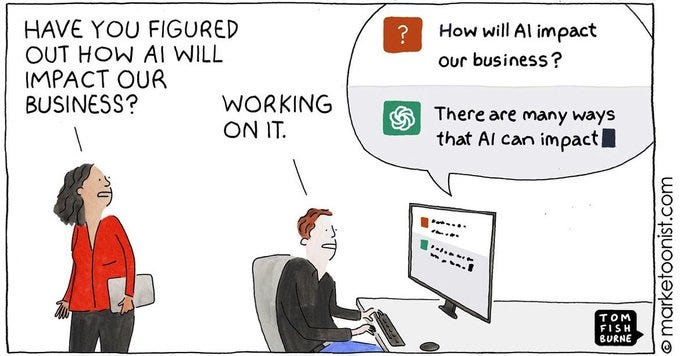The robots are coming...
Quick thoughts on the mind-blowing potential of new AI technologies in the workplace
Dear sublime reader,
In 2022, we finally got to see AI live up to its hype.
I remember being sceptical about how it would impact the workforce, but my recent experimentation with various AI products has completely changed my perspective.
ChatGPT from OpenAI, VALL-E from Microsoft, Foundry from Palantir, and Midjourney are just a few examples of the incredible capabilities of AI.
I was blown away by what ChatGPT can do: craft product roadmaps, generate scripts, debug code, role play as a McKinsey consultant, hallucinate fiction, and so much more.
It's like having a generalist colleague on call 24/7. So now it's part of my daily workflow.
I'm obviously downplaying the potential for its misuse and flaws — an entirely vast topic in itself. And the fact that it struggles with common sense or logical reasoning.
But, but, but —
Some context: our brains have about 80-100 billion neurons and about 100 trillion synapses.
ChatGPT and many current tools run on GPT-3 or GPT-3.5 — Large Language Models trained on 175 billion parameters. These parameters help them predict the next word in a sequence of words.
Rumours are swirling about the impending arrival of GPT-4, pretrained on 100 trillion parameters. Yes, that number is as big as it sounds. More parameters lead to better predictions. Kinda like what our brains do.
With VALL-E, you can clone your own voice in seconds, and Midjourney can generate hyper-realistic images and creative artwork from just a simple text prompt.
But the real kicker is companies like DoNotPay (positioned as the world’s first Robot Lawyer) that are building AI systems that can represent you in court. Imagine having an AI that can listen to proceedings and tell you how to argue your case. It's truly mind-boggling.
The true power of these AI systems seem to depend on your ability to clearly convey your intentions using well-defined prompts. Anything short of that leads to good ol’ maxim, garbage in, garbage out.
Go deeper:
OpenAI: learn more about the team whose goal is “to advance digital intelligence in the way that is most likely to benefit humanity as a whole”
Towards GPT-4: are there any limits to large neural networks?
Looking ahead
And the best part? We're still in the very early stages of these technologies. Can you imagine what the future holds? (Assuming the compute side can keep up with the demand).
Despite all this, I still believe that AI won't replace humans entirely.
We'll probably anthropomorphise some of these tools and call them "Digital Workers" an keep going. Or as IBM puts it:
In the past, the term “digital worker” described a human employee with digital skills, but more recently, the market has defined it as a category of software robots, which are trained to perform specific tasks or processes in partnership with their human colleagues. More specifically, Forrester offers the following definition for digital worker automation: It is “a combination of [intelligent automation] IA building blocks, such as conversational intelligence and [robotic process automation] RPA, that work alongside employees. They understand human intent, respond to questions, and take action on the human's behalf, leaving humans with control, authority, and an enhanced experience.”
Looking further ahead
Instead, humans using AI will replace other humans.
Which means, by 2030, small teams of 2-4 highly motivated individuals will be able to leverage AI to build billion-dollar companies. The wealth inequality that will ensue is a topic for another day, but it's something that we need to start thinking about.
For now, one thing is for sure, someone somewhere will use ChatGPT to write a eulogy for someone they love by year’s end. And that’s okay.
💭 Final thoughts
All human inventions are akin to double-edged swords. As such, the good, the bad, and the ugly all coexist within them. AI is no different.
Share your thoughts by replying to this post.



I like your take on AI
One of the things that interests me about AI is how - as we learn more about how to improve it - it has the potential to teach us more about ourselves.